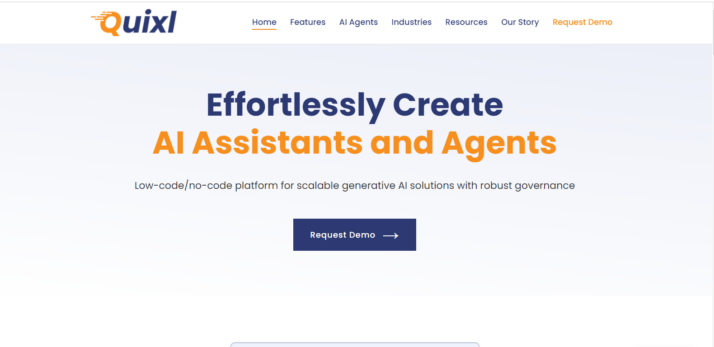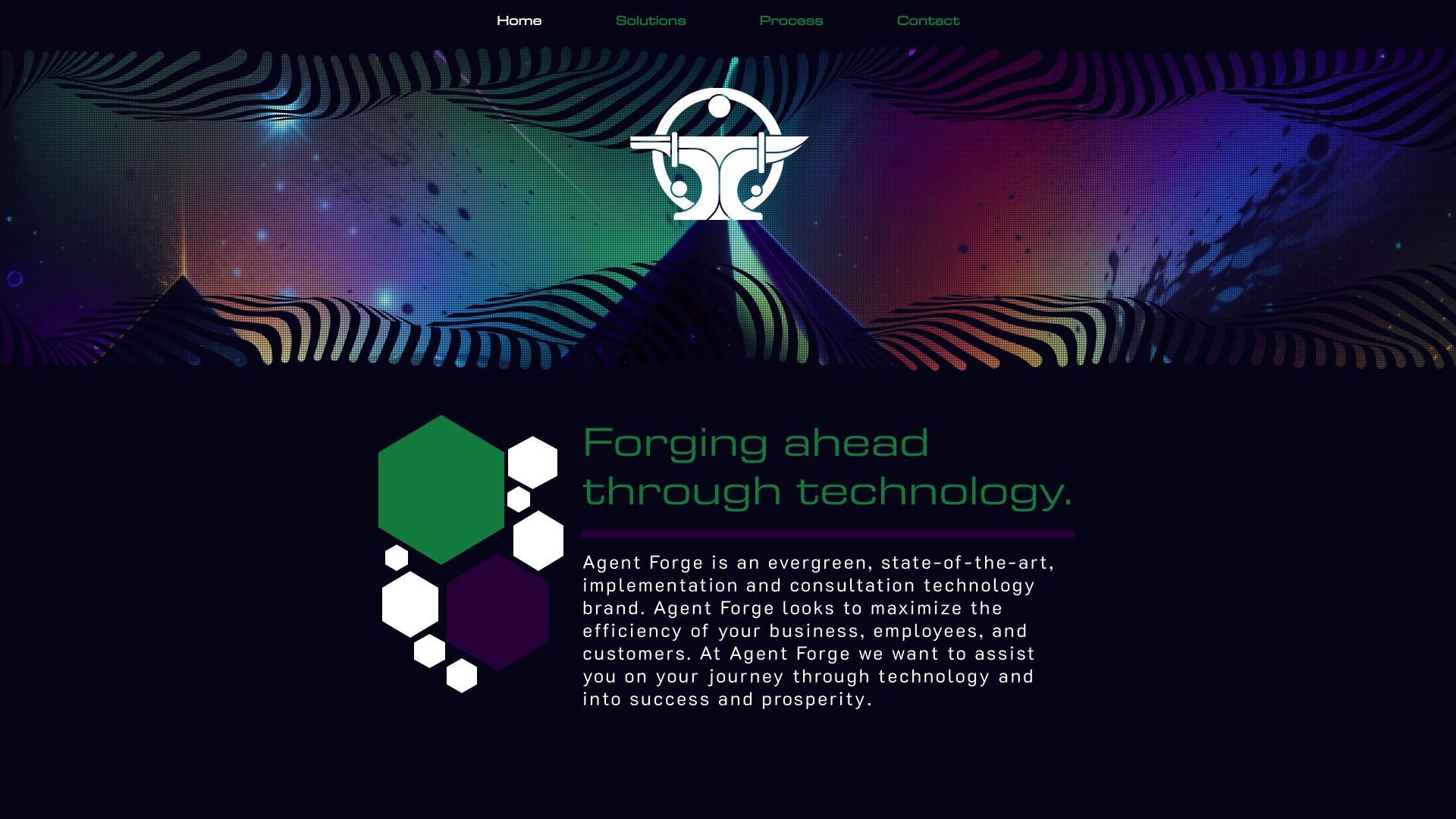Quixl AI vs. Agent Forge: Comparing AI Development Platforms
AI agent development platforms are revolutionizing how businesses harness artificial intelligence. This review compares three leading solutions: Quixl AI vs. Agent Forge, and SmythOS. Quixl AI offers a commercial platform with enterprise features, while Agent Forge provides an open-source framework for developers. SmythOS emerges as a versatile option, combining powerful capabilities with user-friendly design. We’ll examine each platform’s strengths, limitations, and ideal use cases to help you choose the best fit for your AI development needs.
Quixl AI Overview
Quixl AI delivers a comprehensive platform for developing and deploying intelligent AI agents across various industries. Built on Integra’s 30 years of technological expertise, Quixl simplifies AI adoption through its no-code visual builder and curated AI Agents Hub. The platform enables rapid creation of AI solutions for tasks like alt-text generation, manuscript assessment, and enterprise knowledge search.


Quixl’s standout features include seamless AI integration, scalable deployment, and a Prompt Studio for advanced customization. The platform caters to diverse industries, enhancing user engagement, personalizing learning experiences, and automating administrative tasks. Its robust API Gateway facilitates easy integration with existing systems, while advanced security measures ensure data protection.
Quixl’s standout features include seamless AI integration, scalable deployment, and a Prompt Studio for advanced customization.
Developers and technical teams benefit from Quixl’s extensive API support and customization options. Business leaders appreciate its scalability and compliance features. For non-technical users, the visual builder and pre-built templates simplify AI implementation. The platform also appeals to AI researchers and startups with its affordability and efficiency gains.
While Quixl offers a powerful suite of tools, users may face challenges in data preparation and integration with legacy systems. The platform’s effectiveness heavily relies on the quality and quantity of available training data. Additionally, as with many AI solutions, users must remain vigilant about potential biases in AI outputs and ensure proper oversight in automated processes.
Agent Forge Overview
Agent Forge empowers developers to create AI-powered autonomous agents and cognitive architectures. This open-source Python framework accelerates the development, testing, and iteration of agents that automate tasks and workflows.


Agent Forge supports major language models like Claude and GPT, as well as self-hosted models via Oobabooga. The platform’s flexible agent memory management uses ChromaDB, while modules orchestrate multi-agent scripts and complex workflows. Pre-built agent templates jumpstart development, complemented by a prompt engineering system to guide agent behavior.
Agent Forge empowers developers to create AI-powered autonomous agents and cognitive architectures. This open-source Python framework accelerates the development, testing, and iteration of agents that automate tasks and workflows.
Developers appreciate Agent Forge’s easy integration of custom data sources and third-party APIs. Shared utility classes for storage, tools, and Natural Language Processing tasks further streamline the development process. This combination of features makes Agent Forge well-suited for prototyping AI assistants, chatbots, and expert systems.
While Agent Forge offers powerful capabilities, its open-source nature may present challenges for users seeking enterprise-grade support or extensive documentation. The platform’s focus on flexibility and customization could require a steeper learning curve for those new to AI development. Additionally, as an open-source tool, it may lack some of the polished user interfaces found in commercial alternatives.
Agent Forge positions itself as an accessible playground for both novices and advanced developers to experiment with autonomous agent architectures. Its modular and extensible nature makes it a solid foundation for long-term AI projects, particularly in task automation, productivity enhancement, and intelligent process automation.
Feature Comparison
Quixl AI and Agent Forge offer different approaches to AI agent development, with distinct strengths and limitations. Quixl AI provides a comprehensive commercial platform with robust features for enterprise-scale deployments, while Agent Forge presents an open-source framework focused on flexibility and customization for developers.
Quixl AI excels in its no-code visual builder and pre-built AI agents, making it accessible to non-technical users. Its curated AI Agents Hub and Prompt Studio enable rapid deployment of AI solutions across industries. Quixl also offers advanced security features, including data encryption and OAuth support, crucial for enterprise applications.
Agent Forge, as an open-source Python framework, provides developers with greater control over agent architectures. It supports major language models and offers flexible memory management using ChromaDB. However, it lacks some of the polished user interfaces and enterprise-grade support found in commercial alternatives like Quixl AI.
A key difference lies in deployment options. Quixl AI’s platform facilitates seamless integration with existing systems and supports various deployment methods, including APIs, webhooks, and site chats. Agent Forge, while flexible, may require more technical expertise to achieve similar deployment versatility. Additionally, Quixl AI’s emphasis on scalability and compliance features makes it more suitable for large-scale enterprise needs, whereas Agent Forge’s modular nature appeals to developers seeking a foundation for long-term AI projects and experimentation.
Feature Comparison Table
| Quixl AI | Agent Forge | SmythOS | |
|---|---|---|---|
| CORE FEATURES | |||
| Visual Builder | ✅ | ❌ | ✅ |
| No-Code Options | ✅ | ❌ | ✅ |
| Explainability & Transparency | ✅ | ❌ | ✅ |
| Debug Tools | ✅ | ❌ | ✅ |
| Multimodal | ✅ | ❌ | ✅ |
| Audit Logs for Analytics | ✅ | ❌ | ✅ |
| Work as Team | ✅ | ❌ | ✅ |
| Bulk Work | ✅ | ❌ | ✅ |
| Agent Work Scheduler | ✅ | ❌ | ✅ |
| Logs & Monitoring | ✅ | ❌ | ✅ |
| SECURITY | |||
| Constrained Alignment | ✅ | ❌ | ✅ |
| Data Encryption | ✅ | ❌ | ✅ |
| OAuth | ✅ | ❌ | ✅ |
| IP Control | ✅ | ❌ | ✅ |
| COMPONENTS | |||
| Foundation AIs | ✅ | ❌ | ✅ |
| Huggingface AIs | ✅ | ❌ | ✅ |
| Zapier APIs | ✅ | ❌ | ✅ |
| All other APIs, RPA | ✅ | ❌ | ✅ |
| Classifiers | ✅ | ❌ | ✅ |
| Logic | ✅ | ❌ | ✅ |
| Data Lakes | ✅ | ❌ | ✅ |
| DEPLOYMENT OPTIONS (EMBODIMENTS) | |||
| Deploy as API | ✅ | ❌ | ✅ |
| Deploy as Webhook | ✅ | ❌ | ✅ |
| Staging Domains | ✅ | ❌ | ✅ |
| Production Domains | ✅ | ❌ | ✅ |
| API Authentication (OAuth + Key) | ✅ | ❌ | ✅ |
| Deploy as Site Chat | ✅ | ❌ | ✅ |
| Deploy as Scheduled Agent | ✅ | ❌ | ✅ |
| Deploy as GPT | ✅ | ❌ | ✅ |
| Scalability | ✅ | ❌ | ✅ |
| DATA LAKE SUPPORT | |||
| Hosted Vector Database | ✅ | ❌ | ✅ |
| Sitemap Crawler | ❌ | ❌ | ✅ |
| YouTube Transcript Crawler | ❌ | ❌ | ✅ |
| URL Crawler | ❌ | ❌ | ✅ |
| Word File Support | ✅ | ❌ | ✅ |
Best Alternative to Quixl AI and Agent Forge
SmythOS emerges as the premier alternative to Quixl AI and Agent Forge, offering a comprehensive agentic AI automation platform that surpasses its competitors in key areas. Our platform combines powerful features with unmatched ease of use, making advanced AI capabilities accessible to users across various technical backgrounds.
We designed SmythOS to address the limitations of other platforms. While Quixl AI and Agent Forge offer some AI development tools, they fall short in providing a truly integrated, scalable, and user-friendly experience. SmythOS excels by offering a visual drag-and-drop interface that simplifies the creation of complex AI workflows, eliminating the need for extensive coding knowledge.
SmythOS excels by offering a visual drag-and-drop interface that simplifies the creation of complex AI workflows, eliminating the need for extensive coding knowledge.
Our platform stands out with its extensive integration ecosystem, supporting a wide array of APIs, AI models, and tools. This flexibility ensures that SmythOS can adapt to virtually any workflow or business process, unlike the more limited options offered by competitors. We provide pre-configured connectors and templates for common tasks, significantly reducing setup time and allowing users to focus on innovation rather than implementation details.
SmythOS shines in its deployment versatility. We enable users to deploy AI agents across various platforms, including as APIs, webhooks, site chats, scheduled agents, and even as ChatGPT plugins or Alexa skills. This level of flexibility is unmatched by Quixl AI or Agent Forge, allowing for seamless integration into existing systems and opening up unlimited use cases for AI automation.
Security and scalability form the backbone of SmythOS. We implement robust security measures, including data encryption and OAuth support, crucial for enterprise applications. Our platform is built to scale, supporting everything from small projects to large-scale enterprise deployments without compromising performance. This scalability, combined with our comprehensive feature set and intuitive interface, positions SmythOS as the superior choice for businesses and developers looking to harness the full potential of AI agents.
Conclusion
Quixl AI, Agent Forge, and SmythOS each offer unique approaches to AI agent development, catering to different user needs and technical expertise levels. Quixl AI provides a robust commercial platform with enterprise-grade features, while Agent Forge offers an open-source framework for developers seeking flexibility. SmythOS, however, stands out as the superior choice, combining the best of both worlds.
SmythOS excels with its intuitive drag-and-drop interface, extensive integration ecosystem, and versatile deployment options. Unlike Quixl AI’s focus on enterprise solutions or Agent Forge’s developer-centric approach, SmythOS democratizes AI development for users across technical skill levels. Its support for multi-agent orchestration and pre-built API integrations significantly accelerates the development process, addressing limitations found in both Quixl AI and Agent Forge.
While Quixl AI and Agent Forge have their strengths, SmythOS’s comprehensive feature set, including advanced security measures, scalability, and support for various AI models, positions it as the most versatile and powerful option. SmythOS’s vision to make AI agent creation 99% faster aligns perfectly with the growing need for efficient, accessible AI solutions across industries.
For those ready to experience the future of AI agent development, we invite you to explore SmythOS’s diverse range of AI-powered agent templates. These templates cover multiple business categories and offer a practical starting point for your AI journey. To truly unleash the power of AI for your business, create a free SmythOS account and start building your own AI agents today. With SmythOS, you’re not just adopting a tool; you’re embracing a revolution in AI-driven productivity and innovation.
Last updated:
Disclaimer: The information presented in this article is for general informational purposes only and is provided as is. While we strive to keep the content up-to-date and accurate, we make no representations or warranties of any kind, express or implied, about the completeness, accuracy, reliability, suitability, or availability of the information contained in this article.
Any reliance you place on such information is strictly at your own risk. We reserve the right to make additions, deletions, or modifications to the contents of this article at any time without prior notice.
In no event will we be liable for any loss or damage including without limitation, indirect or consequential loss or damage, or any loss or damage whatsoever arising from loss of data, profits, or any other loss not specified herein arising out of, or in connection with, the use of this article.
Despite our best efforts, this article may contain oversights, errors, or omissions. If you notice any inaccuracies or have concerns about the content, please report them through our content feedback form. Your input helps us maintain the quality and reliability of our information.
